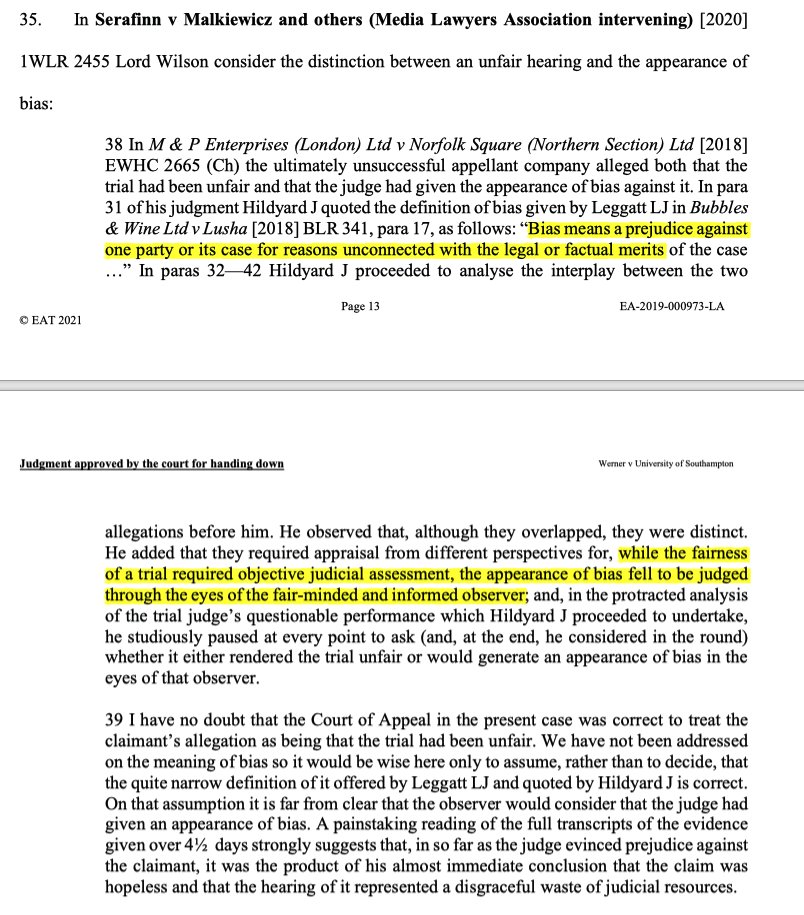1/ Werner v Southampton Uni: a sigh of relief for the uni as the EAT finds no bias in the ET's grant of an extension of time to enter the ET3, which they'd failed to enter through a litany of errors, & which had led to a £3.5m compensatory award!
assets.publishing.service.gov.uk/media/6177e1dd…
#ukemplaw
assets.publishing.service.gov.uk/media/6177e1dd…
#ukemplaw
2/ W was a Professor of International Banking from 2005 to resignation in 2018. He brought unfair dismissal, race & religion/belief discrim, holiday pay, arrears & other payments claims to the ET, complaining of career obstruction.
3/ In his ET1, W sought compensation of £4,375,000 - around 64 times his gross annual salary! His claim centred on his assertion his treatment was because he was a German Christian who believed banking concentration is a cancer to society.
4/ The Uni failed to respond to the claim in time. This led to a hearing at which a r.21 award was made to W for all his claim save the 'other payments', totalling just under £3.5m.
5/ Probably coupled with a cold sweat, the Uni belatedly applied a week later under r.20 for an extension to present the ET3, & thereby to set aside the judgment in W's favour. The Uni accepted a litany of embarrassing errors in failing to submit the ET3 in time.
6/ The EJ accepted the evidence was full & honest, considered W's underlying claims were weak & that the balance of prejudice favoured the Uni being granted the extension & that his earlier judgment be set aside.
W appealed. A ground of apparent bias proceeding to the FH.
W appealed. A ground of apparent bias proceeding to the FH.
7/ The apparent bias claim related particularly to the EJ entering the arena to intervene in XX of the Uni's lawyer, who gave evidence on the reasons for failing to put in the ET3. It also related to an allegation the EJ exploded at W when he raised a disclosure request.
8/ HHJ Tayler very helpfully sets out the material part of Serafinn on the distinction between apparent bias & conduct creating an unfair trial - the former is viewed through the eyes of a fair-minded informed observer, the latter requires objective judicial assessment. 

9/ On unfair hearings, the EAT noted from Serafinn the need for infrequency of intervention in cross-examination & the risk of a judge descending into the arena, as well as recognition that the LiP is more likely to be daunted than the professional advocate. 

10/ From the CA in Jemaldeen, the EAT noted that there's no requirement for a Judge to sit silently, but a host of appropriate reasons for intervening, so long as the Judge takes care not to descend into the arena, whilst noting that XX loses effectiveness if broken into lots. 

11/ However, HHJ Tayler noted that ET r41 itself recognises the appropriateness of the ET questioning witnesses to clarify issues or to elicit evidence, & that a party doesn't have the right to cross-examine come what may, & there may need to be greater intervention with an LiP 





12/ Moving on to apparent bias, the classic approach is the fair-minded, informed observer approach from Porter v Magill, noting that such an observer is to be distinguished from the parties, as they lack the objectivity of fair-mindedness. 

13/ The EAT noted definitions of bias include a prejudice unrelated to the case's legal or factual merits & prejudgment by way of a closed mind - though there isn't prejudgment bias by expressing a view or scepticism on the merits unless coupled with unwillingness to be persuaded 





14/ Moreover, robust language, even discourteous language breaching professional guidance for judges, wasn't itself necessarily evidence of bias. 

15/ The EAT acknowledged there is some overlap between cases of apparent bias & substantive unfairness - a judge's failure to appropriately discharge his judicial functions may lead a fair-minded, informed observer to conclude there's a real possibility of bias. 

16/ Much of W's bias allegations related to the use of robust language by the EJ in his judgment. HHJ Tayler couldn't see how the words used could possibility lead the fair-minded, informed observer to a conclusion of bias. 

17/ There may be much to be said for judicial understatement but that didn't mean forceful language representing the EJ's conclusions on the merits were indicative of a real possibility of bias. 

18/ The EAT moved on to consider W's complaints about the EJ intervening in his cross-examination of the Uni's lawyer, finding there was nothing in the transcripts & evidence to suggest W wasn't given a fair opportunity to cross-examine her.
19/ As regards W's allegations of a judicial explosion at him raising disclosure at the CMH, the EAT noted such hearings are in private & hence can permit a more robust exchange of views than a public PH or final hearing, & CMHs allow for proactivity & focus on merits & ADR/JM. 

20/ The EAT noted the EJ's frustration overflowed as the hour of the CMH became late. However, it wasn't alleged his decisions at that PH were unfair & it wasn't right to find that these explosions were indicative of bias earlier on in the day prior to these frustrated comments. 



21/ The appeal was thus dismissed on all grounds. There remains outstanding an application to the CA for permission to appeal the refusal at a 3(10) to allow W to appeal against the merits of the r.20 decision, but I suspect that's doomed to fail.
22/ As a result, it looks entirely possible that Professor Werner will end up being £3.5m worse off than he once believed, & a very embarrassed uni legal department will live to fight another day & will now deal with ET3s more quickly than any other uni in the land!
• • •
Missing some Tweet in this thread? You can try to
force a refresh








